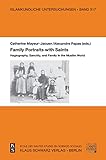Family Portraits with Saints : Hagiography, Sanctity, and Family in the Muslim World / ed. by Catherine Mayeur-Jaouen, Alexandre Papas.
Material type: TextSeries: Islamkundliche Untersuchungen ; 317Publisher: Berlin ; Boston : De Gruyter, [2020]Copyright date: ©2020Description: 1 online resource (1 p.)Content type:
TextSeries: Islamkundliche Untersuchungen ; 317Publisher: Berlin ; Boston : De Gruyter, [2020]Copyright date: ©2020Description: 1 online resource (1 p.)Content type: - 9783879974221
- 9783112208991
- 297.64 22/ger
- online - DeGruyter
- Issued also in print.
| Item type | Current library | Call number | URL | Status | Notes | Barcode | |
|---|---|---|---|---|---|---|---|
 eBook
eBook
|
Biblioteca "Angelicum" Pont. Univ. S.Tommaso d'Aquino Nuvola online | online - DeGruyter (Browse shelf(Opens below)) | Online access | Not for loan (Accesso limitato) | Accesso per gli utenti autorizzati / Access for authorized users | (dgr)9783112208991 |
Frontmatter -- Table of Contents -- Introduction -- 1. Holy Models for Family Scene -- Le Prophète en famille -- Les enfants qu’ils étaient : récits d’enfance merveilleuse dans Anbā’ nujabā’ al-abnā’ d’Ibn Zafar al-Siqillī et leur valeur comme source historique -- The Prophet’s Family as the Perennial Source of Saintly Scholars: Al-Samhūdī on ʿilm and nasab -- Sainthood as Patrimony: ʿAbd Allāh al-ʿAydarūs (d. 1461) and his Descendants -- 2. Brotherhood and Familyhood -- Nasab, Baraka and Land: Hagiographic and Family Memory entwined in the Egyptian Brotherhood of Sharnūbiyya, from the Fourteenth Century until Today -- Shurafāʾ and Sufis: the Qādiriyya Būdshīshiyya in Contemporary Morocco -- Ahl-i Haqq Consecrated Families (khāndān) -- 3. The Fathers -- ʿAbd al-Karīm al-Qushayrī (d. 465/1072) Family Ties and Transmission in Nishapur’s Sufi Milieu during the Tenth and Eleventh Centuries -- “The Son is the Secret of the Father”: Rūmī, Sultān Veled and the Strategy of Family Feelings -- The Saint as Ancestor in some Sufi and Ismaili Communities of the Sindhi Area -- 4. Wives, Mothers, and Grandmothers -- Portrait d’un saint d’Ifrīqīya dans sa famille ou l’épouse comme source pour l’hagiographe d’après al-Asrār al-jaliyya fī l-manāqib al-dahmāniyya d’al-Dabbāgh (m. 699/1300) -- Women and Kinship in Medieval Moroccan Hagiography: a Study of al-Bādisī’s al-Maqsad al-sharīf (Eighth/Fourteenth Century) -- The Son of his Mother: Qalandarī Celibacy and the “Destruction” of Family -- Selective General Bibliography -- List of Contributors -- Thematic Index
restricted access online access with authorization star
http://purl.org/coar/access_right/c_16ec
The topic of the present volume lies at the crossing of two main subjects in Islamic studies: sanctity and family. Seeking to explain the relationships between saints and society through the family institution, the book strives to enlarge the vision of the family as well as to analyse more concretely the role of saints – the patterns of the Prophet and his relatives, problems related to the hereditary transmission of charisma; the relations between the spiritual family and the physical family, or between disciples and the saint’s family; the spiritual master as father and the father as spiritual master; and the crucial role of women. Accordingly, the table of contents resembles a family portrait, and features synthetic articles as well as case studies which cover the medieval, modern and contemporary periods, throughout different parts of the Muslim world (Maghrib and Mashriq, Anatolia, Iran, India, Pakistan and Central Asia). This collective reflexion is the result of previous research done on Islamic hagiography from an anthropological or historical perspective; also, it seeks to benefit from the recent development of family history in Islam.
Issued also in print.
Mode of access: Internet via World Wide Web.
In English.
Description based on online resource; title from PDF title page (publisher's Web site, viewed 28. Feb 2023)


